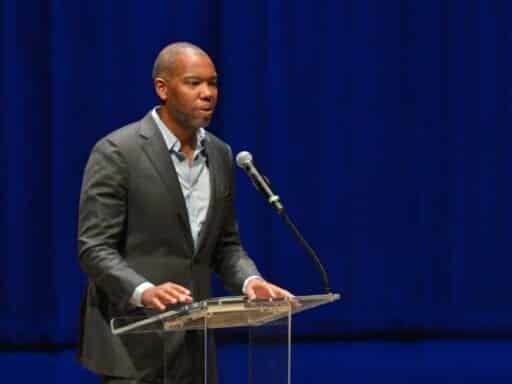Ta-Nehisi Coates and Vox’s Ezra Klein discuss cultural power, demographic change, and Ezra’s “cold, atheist book.”
This episode of The Ezra Klein Show was a pleasure. Ta-Nehisi Coates joined me in Brooklyn for part of the Why We’re Polarized tour. His description of the book may be my favorite yet. It is, he says, “a cold, atheist book.”
We talk about what that means, and from there go into some of the harder questions raised not so much by the book but by American history itself. Then Coates asked me a question I never expected to hear from him: Is there anything I could say to leave him with some hope? Don’t miss this one.
A lightly edited excerpt from our discussion follows. You can listen to our whole conversation on The Ezra Klein Show.
Ta-Nehisi Coates
I think to the extent that you see real power changing in this country, you see it in culture rather than politics. This is why people find Black Panther infuriating — it has nothing to do with the content. But you get all of these responses like, “Why do I have to like this? Why is this being rammed down my throat?” I think what’s happened is people who previously did not have power now have power. Shonda Rhimes has actual power to actually affect what you’re going to see on your television.
Ezra Klein
This to me is such an underplayed part of the political moment right now. I love the way Rebecca Traister talks about this: People can see when new groups are gaining the power to be represented in culture, to see their cultural preferences made real, to be represented in politics. It’s noticeable. And the loss of power among people who used to have it in an unquestioned way is also powerful.
Something I talk about in the book is that you can’t pretend that it doesn’t feel like a loss. But one of the hard things about that is, on the other side, it’s not yet a win. Power has not actually shifted to a new dominant majority. What we are witnessing is only the very beginning. We get the first African American president ever and the result is Donald Trump.
Ta-Nehisi Coates
I think we don’t always realize the extent to which the culture actually interacts with politics. You say something in the book about how the effects of demographics are not felt in the immediate moment — it happens much later. And I think it’s actually the same way for culture. I think those who perceive a threat symbolically from Barack Obama are kind of correct because kids are going to grow up and they’re going to remember as a great authority figure this guy who was African American. And if it matters that all the other presidents before him were white, then it has to matter that he is black. So, if white identity is important to you, then that might be threatening to you.
Ezra Klein
I have a line in the book that culture runs 10 years ahead of demographics and politics runs 10 years behind. Nike makes [Colin] Kaepernick their spokesman because they want to win the future. They want to appeal to young people, and young America is much more diverse. For the same reason, cable news networks only care how many people watch between 18 and 40 years old.
So cultural power is trying to win over the America that is to come. Political power — if you look at who votes and whose power is amplified by American geography — is operating behind. And then economic power is compounding over time. So there’s a deep instability in our politics right now where it is not wrong that this sort of Trump coalition feels itself losing a power it had. But it’s completely wrong to say that it has lost power. That’s disorienting for everybody because they’re reacting to loss, but it’s not like there’s some winner on the other side who can just sort of move forward with the agenda. So we’re in this incredibly clenched moment of very sharp conflict.
You can listen to the full episode by subscribing to The Ezra Klein Show on Apple Podcasts, Spotify, Stitcher, or wherever you get your podcasts.
Author: Ezra Klein
Read More



